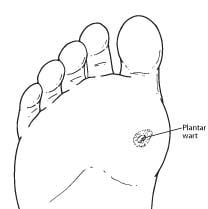Our Locations
Find us on the map
Hours of Operation
Our Regular Schedule
Vero Beach Location
Monday:
9:00 AM-5:00 PM
Tuesday:
9:00 AM-5:00 PM
Wednesday:
9:00 AM-5:00 PM
Thursday:
9:00 AM-5:00 PM
Friday:
9:00 AM-12:00 PM
Saturday:
Closed
Sunday:
Closed
Sebastian Location
Monday:
9:00 AM-5:00 PM
Tuesday:
9:00 AM-5:00 PM
Wednesday:
9:00 AM-5:00 PM
Thursday:
9:00 AM-5:00 PM
Friday:
9:00 AM-12:00 PM
Saturday:
Closed
Sunday:
Closed


 There are two types of plantar warts:
There are two types of plantar warts: